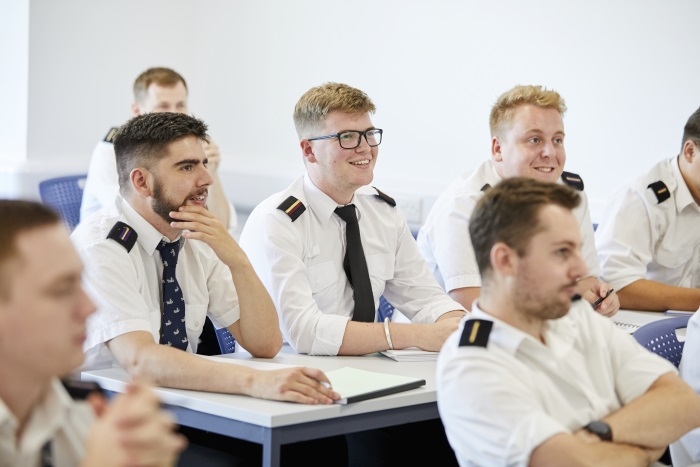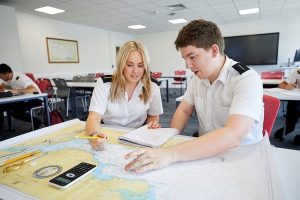The United Kingdom, with its long-standing maritime history and global influence, plays a significant role in shaping the future of maritime education. With world-renowned institutions, regulatory frameworks, and a tradition of excellence, the UK stands at the forefront of preparing seafarers, marine engineers, naval architects, and maritime professionals for commercial careers. The United Kingdom is a crucial global hub for maritime and marine studies, thanks to its concentration of key maritime organizations and institutions. Home to the International Maritime Organization (IMO), a specialized UN agency that sets global shipping standards, the UK also hosts world-renowned entities like ship brokers, credited P&I clubs, and Lloyd’s of London, a leader in maritime insurance, and leading Lloyd’s Register (LR) maritime classification society.
The STCW and the UK’s Compliance
The UK has been a leading maritime power for centuries, from its naval dominance in the 18th and 19th centuries to its role as a modern shipping hub. The British Isles’ strategic location and natural access to global trade routes have fostered a maritime industry that is intertwined with the country’s economy, defense, and global influence. Maritime education and training in the UK are governed by the International Maritime Organization’s (IMO) Standards of Training, Certification, and Watchkeeping for Seafarers (STCW) convention. As a founding member of the IMO, the UK has fully integrated STCW standards into its maritime educational framework. The UK Maritime and Coastguard Agency (MCA) ensures that training institutions comply with these international standards, ensuring that graduates are globally recognized and qualified to work on international vessels.
Major Maritime Institutions in the UK
The UK is home to several prestigious maritime academies and universities that offer comprehensive training in navigation, marine engineering, naval architecture, and maritime management. These institutions collaborate closely with the maritime industry, ensuring that graduates are well-prepared for the challenges of modern shipping and seafaring.

1. Warsash Maritime Academy (Solent University)
- Location: Southampton
- Overview: Warsash is one of the leading maritime academies globally, offering a wide range of courses for deck and engineering officers, as well as specialized courses in marine safety, firefighting, and offshore operations.
- Programs: Warsash provides cadetships, officer training, simulator training, and professional short courses for maritime professionals.
- Notable Features: Warsash’s state-of-the-art simulation facilities allow for real-time training in ship maneuvering, engine room operations, and bridge management.
2. Maritime Greenwich (University of Greenwich)
- Location: London
- Overview: The University of Greenwich offers undergraduate and postgraduate programs in maritime management, transport, and logistics.
- Programs: Degrees in Maritime Management, International Shipping and Logistics, and Global Trade.
- Notable Features: A focus on management, law, and sustainability in maritime operations, making it ideal for professionals looking to move into leadership roles within the shipping industry.
3. City of Glasgow College
- Location: Glasgow, Scotland
- Overview: With a reputation for high-quality maritime education, City of Glasgow College provides training for both deck and engineering officers.
- Programs: Merchant Navy Officer Training (deck and engineering), as well as professional development courses in ship management and operations.
- Notable Features: Extensive partnerships with shipping companies for cadet sponsorships, and a strong focus on practical sea training.
4. South Shields Marine School
- Location: South Tyneside, England
- Overview: Established in 1861, South Shields Marine School is one of the UK’s oldest maritime training schools.
- Programs: Cadet programs for both deck and engineering officers, as well as advanced courses for maritime professionals.
- Notable Features: South Shields offers cutting-edge bridge and engine room simulation facilities, as well as specialized training in dynamic positioning and tanker operations.
5. Liverpool John Moores University (LJMU)
- Location: Liverpool
- Overview: LJMU offers programs focused on maritime science, engineering, and operations.
- Programs: Marine and Offshore Engineering, Nautical Science, Maritime Operations.
- Notable Features: Strong links with industry, with students benefiting from hands-on training and research opportunities in port cities like Liverpool.
Training Programs and Pathways
Maritime education in the UK follows structured pathways that lead to internationally recognized certifications. These pathways cater to different career stages, from entry-level cadet training to advanced professional development for senior officers and maritime managers.
1. Cadet Training Programs
Cadet training forms the backbone of maritime education in the UK. Aspiring deck officers, marine engineers, and electro-technical officers (ETO) typically enroll in cadetship programs sponsored by shipping companies. These programs combine theoretical learning with practical sea time, ensuring that cadets gain the skills and experience needed to work on commercial ships.
- Deck Officer Cadetship: Focuses on navigation, ship handling, and bridge operations.
- Marine Engineering Cadetship: Covers engine room operations, machinery maintenance, and engineering systems.
- ETO Cadetship: Trains cadets in electrical systems, automation, and electronics on board vessels.
2. Simulator-Based Training
Simulation plays a crucial role in maritime education. UK institutions invest heavily in bridge and engine room simulators that replicate real-world conditions. These simulators allow cadets and professionals to practice complex operations in a controlled environment, enhancing decision-making and technical skills without the risks of real-life scenarios.
3. Postgraduate and Professional Development
For maritime professionals looking to advance their careers, the UK offers a wide range of postgraduate degrees and professional short courses. These programs cater to those seeking to specialize in areas such as maritime law, logistics, ship management, or naval architecture. Courses are designed in collaboration with industry stakeholders to meet the evolving needs of the maritime sector.
Challenges in UK Maritime Education
Despite its global reputation, the UK’s maritime education sector faces several challenges:
1. Technological Advancements :The maritime industry is rapidly adopting new technologies, from automation and artificial intelligence to greener propulsion systems. Training institutions need to keep pace with these changes to ensure that cadets and professionals are equipped with the latest skills.
2. Attracting New Talent:The shipping industry, like many sectors, struggles to attract younger generations. The perception of long hours at sea, isolation, and the demanding nature of the work can deter potential recruits. Maritime institutions must work with industry bodies to highlight the diverse career opportunities and advancements in living conditions onboard modern ships.
3. Decarbonization and Sustainability:As the maritime industry seeks to reduce its carbon footprint, maritime education must incorporate training on decarbonization technologies, alternative fuels, and sustainable shipping practices. Institutions must adapt their curricula to align with new environmental regulations and market demands.
Future Trends in UK Maritime Education
The future of maritime education in the UK is shaped by evolving industry needs, technological advancements, and global regulations. Several key trends are influencing the development of maritime training:
1. Decarbonization and Green Shipping : With the IMO’s goal of reducing greenhouse gas emissions, UK maritime institutions are incorporating sustainability into their training programs. Courses on alternative fuels, energy-efficient ship design, and carbon management are becoming integral to maritime education.
2. Digitalization and Automation: As the shipping industry becomes more automated, with autonomous ships on the horizon, maritime education is evolving to include training in data analytics, artificial intelligence, and cybersecurity. Future seafarers and maritime professionals will need to manage and operate increasingly sophisticated digital systems.
3. Interdisciplinary Learning: Maritime education is no longer confined to traditional deck and engineering training. Modern programs are increasingly interdisciplinary, covering aspects of management, law, sustainability, and supply chain logistics. This broadens the career scope for graduates, allowing them to take on leadership roles in shipping companies, port authorities, and international organizations.
The UK remains a global leader in maritime education, providing world-class training to seafarers, engineers, and maritime professionals. As the industry undergoes rapid technological and environmental changes, UK maritime institutions are adapting to meet the needs of the future workforce. With a rich maritime heritage, cutting-edge training facilities, and a commitment to global standards, the UK continues to prepare the next generation of seafarers and maritime professionals to navigate the challenges of the 21st century.



that is great, thank you.
This was beautiful Admin. Thank you for your reflections.
I’m often to blogging and i really appreciate your content. The article has actually peaks my interest. I’m going to bookmark your web site and maintain checking for brand spanking new information.
Very well presented. Every quote was awesome and thanks for sharing the content. Keep sharing and keep motivating others.
For the reason that the admin of this site is working, no uncertainty very quickly it will be renowned, due to its quality contents.
Thanks to IMO HQ in London, UK has the privilege that be still the centre of maritime industry and policy.
I have been absent for some time, but now I remember why I used to love this website. Thank you, I’ll try and check back more often. How frequently you update your web site?
Perfectly written content material, thanks for selective information.
Hello. impressive job. I did not anticipate this. This is a impressive story. Thanks!